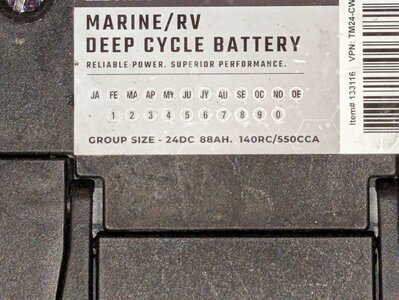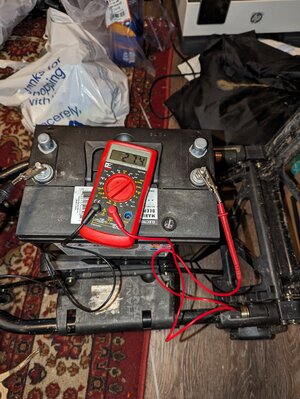Navigation
Install the app
How to install the app on iOS
Follow along with the video below to see how to install our site as a web app on your home screen.
Note: This feature may not be available in some browsers.
More options
Style variation
Welcome to RVForums.com
- Register now and join the discussion
- Friendliest RV Community on the web
- Modern site for PC's, Phones, Tablets - no 3rd party apps required
- Ask questions, help others, review campgrounds
- Get the most out of the RV Lifestyle
- Invite everyone to RVForums.com and let's have fun
- Commercial/Vendors welcome
You are using an out of date browser. It may not display this or other websites correctly.
You should upgrade or use an alternative browser.
You should upgrade or use an alternative browser.
Going off grid.
- Thread starter Degnr8
- Start date
TheLooks
RVF 1K Club
- Joined
- Jun 30, 2021
- Messages
- 1,163
- Location
- Harrison, TN
- RV Year
- 2004
- RV Make
- Winnebago
- RV Model
- 431C Minnie Winnie
- RV Length
- 31 ft
- Fulltimer
- No
The E 350 is a bus conversion with a wheelchair lift, hence the 24 volt. The trailer I have no idea why but it came with a 24 volt battery. It's a 2023 Coleman light. I'm planning to do solar. I've ordered 400 watt panels for both along with charge controllers. The trailer came with a 24v 88 AH battery. That should be good for the bus, but I'm looking for 300 AH for the trailerLets go back to your first post. You say you have an Econoline E350, so do I but mine is 30 years old. How do you come to have a 24v system in it? And I have never seen a 24v production camper. It seems you are talking about a solar system in your 350? In your trailer?
TheLooks
RVF 1K Club
- Joined
- Jun 30, 2021
- Messages
- 1,163
- Location
- Harrison, TN
- RV Year
- 2004
- RV Make
- Winnebago
- RV Model
- 431C Minnie Winnie
- RV Length
- 31 ft
- Fulltimer
- No
Almost nothing else in that bus is 24 v. So I don't think the main power is 24v. If the wheel chair lift uses 24v by pulling from 2 batteries in series that does not mean everything else is running on it. Check voltage at any bulb in the lighting system. Check it at the hitch plug. I don't think Coleman has ever made a 24 volt camper. They make campers exclusively for Camping World.
Please show me a picture of this battery.
Please show me a picture of this battery.
Kevin D Pem
RVF 5K Club
- Joined
- Jul 29, 2020
- Messages
- 5,293
- Location
- AZ
- RV Year
- 1984
- RV Make
- Alpinelite
- RV Length
- 26'
- TOW/TOAD
- 2016 Ram 1500
- Fulltimer
- Yes
Typically two 12vdc batteries are connected in series, for 24volts. If lithium is your desire be sure the BMS will work with 24volts. If you choose lead, may I suggest Northstar Blue+ batteries. I sourced mine from Northern Arizona Wind and Solar. They too, are expensive, but the cycle life of its carbon lead technology leaves lithium in the dust! They come with bus bars to connect them in series.The bus only has one battery, a 24 volt. Here's the battery that came with the trailer
The math told me at time of purchase put them inline with QUALITY AGM BATTERIES. Oops had the cap button on, to lazy to fix it!!! Now I was in the market for a new 12v battery and went shopping, only to consider other options, the prices have gone through the roof!!! So telling you what technology holds the best deal in the current market, only the powers pushing technology can tell!
TheLooks
RVF 1K Club
- Joined
- Jun 30, 2021
- Messages
- 1,163
- Location
- Harrison, TN
- RV Year
- 2004
- RV Make
- Winnebago
- RV Model
- 431C Minnie Winnie
- RV Length
- 31 ft
- Fulltimer
- No
LookThe bus only has one battery, a 24 volt. Here's the battery that came with the trailer
At the next picture. It's reading 27vThat is a group size designation.......It is not 24 volts DC. Put a meter on it.
IF you replace and can fit it in put a 27 in.
Attachments
Kevin D Pem
RVF 5K Club
- Joined
- Jul 29, 2020
- Messages
- 5,293
- Location
- AZ
- RV Year
- 1984
- RV Make
- Alpinelite
- RV Length
- 26'
- TOW/TOAD
- 2016 Ram 1500
- Fulltimer
- Yes
There you go!Look
At the next picture. It's reading 27v
Kevin D Pem
RVF 5K Club
- Joined
- Jul 29, 2020
- Messages
- 5,293
- Location
- AZ
- RV Year
- 1984
- RV Make
- Alpinelite
- RV Length
- 26'
- TOW/TOAD
- 2016 Ram 1500
- Fulltimer
- Yes
The dimensions for the Northstar Blue can be found here
 www.northstarbattery.com
www.northstarbattery.com
I use the blue+ and was willing to accommodate the form factor. I use the 190s and they are setup as 24 volt system. My system consists of two batteries making 190 amps of storage.
Household fridge and freezer are what I limit my usage to on cloudy days in AZ and run the charger when needed. In the last year I had to drain the old gas before running it because 6 or more months go by between it's need.
My solar is considerably larger than what you plan, and that makes a big difference, however you should be fine with 800 watts.
The big difference would be I can use electric appliances during the day without the batteries taking a hit! Actually my controllers go into bulk charge mode when I use high use loads. So at the end of the day my batteries have a higher state of charge!!!
If you are planning to increase your bank, then plan as well, for different form factor batteries. Also look at the PDFs at the link above.
My daughter who lives off grid in Florida, was using these batteries for 4 years when she told me about them 3 years ago. She still has no problems with them, and I wouldn't replace them with anything else.
EnerSys | Global Leader in Stored Energy & Power Solutions
Discover EnerSys, the global leader in stored energy solutions, delivering innovative batteries, chargers, and power systems for industrial and mission-critical applications.
I use the blue+ and was willing to accommodate the form factor. I use the 190s and they are setup as 24 volt system. My system consists of two batteries making 190 amps of storage.
Household fridge and freezer are what I limit my usage to on cloudy days in AZ and run the charger when needed. In the last year I had to drain the old gas before running it because 6 or more months go by between it's need.
My solar is considerably larger than what you plan, and that makes a big difference, however you should be fine with 800 watts.
The big difference would be I can use electric appliances during the day without the batteries taking a hit! Actually my controllers go into bulk charge mode when I use high use loads. So at the end of the day my batteries have a higher state of charge!!!
If you are planning to increase your bank, then plan as well, for different form factor batteries. Also look at the PDFs at the link above.
My daughter who lives off grid in Florida, was using these batteries for 4 years when she told me about them 3 years ago. She still has no problems with them, and I wouldn't replace them with anything else.
TheLooks
RVF 1K Club
- Joined
- Jun 30, 2021
- Messages
- 1,163
- Location
- Harrison, TN
- RV Year
- 2004
- RV Make
- Winnebago
- RV Model
- 431C Minnie Winnie
- RV Length
- 31 ft
- Fulltimer
- No
TheLooks
RVF 1K Club
- Joined
- Jun 30, 2021
- Messages
- 1,163
- Location
- Harrison, TN
- RV Year
- 2004
- RV Make
- Winnebago
- RV Model
- 431C Minnie Winnie
- RV Length
- 31 ft
- Fulltimer
- No
Kevin D Pem
RVF 5K Club
- Joined
- Jul 29, 2020
- Messages
- 5,293
- Location
- AZ
- RV Year
- 1984
- RV Make
- Alpinelite
- RV Length
- 26'
- TOW/TOAD
- 2016 Ram 1500
- Fulltimer
- Yes
Or not!Well, there ya go. I still don't think Coleman did that, but maybe. And to run the E350 on 24v they must have installed something to reduce the voltage to all the components in the truck.
TheLooks
RVF 1K Club
- Joined
- Jun 30, 2021
- Messages
- 1,163
- Location
- Harrison, TN
- RV Year
- 2004
- RV Make
- Winnebago
- RV Model
- 431C Minnie Winnie
- RV Length
- 31 ft
- Fulltimer
- No
So you think the engine computers and the bulbs and all the workings are fine at 24v? Hmmm. Maybe I need to study it a bit. Not sure why other then to satisfy my own questions. I don't think I will be building anything as long as I can get a generator. Noticed some Cummins 24v threads while searching.....
sanda
RVF Expert
- Joined
- Mar 24, 2021
- Messages
- 527
- Location
- Pueblo West, Co.
- RV Year
- 2017
- RV Make
- Cougar
- RV Length
- 28'
- Fulltimer
- No
Latest resources
-
-
Trueline Leveling System (Valid Air)Operation & Service Manuals for the Valid Air leveling system
- Jim
- Updated:
-
-
Notes on the Electrical Systems of the Roadtrek Zion Family of RVsNotes on the Electrical Systems of the Roadtrek Zion Family of RVs
- dilbertjth
- Updated:
-














